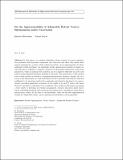On the approximability of adjustable robust convex optimization under uncertainty
Author(s)
Bertsimas, Dimitris J.; Goyal, Vineet
DownloadBertsimas_On the approximability.pdf (329.5Kb)
OPEN_ACCESS_POLICY
Open Access Policy
Creative Commons Attribution-Noncommercial-Share Alike
Terms of use
Metadata
Show full item recordAbstract
In this paper, we consider adjustable robust versions of convex optimization problems with uncertain constraints and objectives and show that under fairly general assumptions, a static robust solution provides a good approximation for these adjustable robust problems. An adjustable robust optimization problem is usually intractable since it requires to compute a solution for all possible realizations of uncertain parameters, while an optimal static solution can be computed efficiently in most cases if the corresponding deterministic problem is tractable. The performance of the optimal static robust solution is related to a fundamental geometric property, namely, the symmetry of the uncertainty set. Our work allows for the constraint and objective function coefficients to be uncertain and for the constraints and objective functions to be convex, thereby providing significant extensions of the results in Bertsimas and Goyal (Math Oper Res 35:284–305, 2010) and Bertsimas et al. (Math Oper Res 36: 24–54, 2011b) where only linear objective and linear constraints were considered. The models in this paper encompass a wide variety of problems in revenue management, resource allocation under uncertainty, scheduling problems with uncertain processing times, semidefinite optimization among many others. To the best of our knowledge, these are the first approximation bounds for adjustable robust convex optimization problems in such generality.
Date issued
2012-09Department
Sloan School of ManagementJournal
Mathematical Methods of Operations Research
Publisher
Springer-Verlag
Citation
Bertsimas, Dimitris, and Vineet Goyal. “On the Approximability of Adjustable Robust Convex Optimization Under Uncertainty.” Mathematical Methods of Operations Research 77, no. 3 (June 2013): 323–343.
Version: Author's final manuscript
ISSN
1432-2994
1432-5217